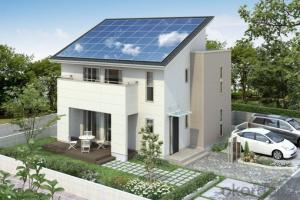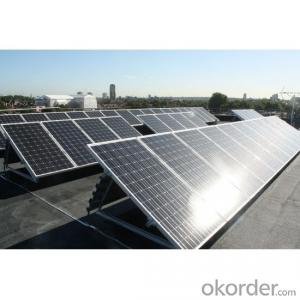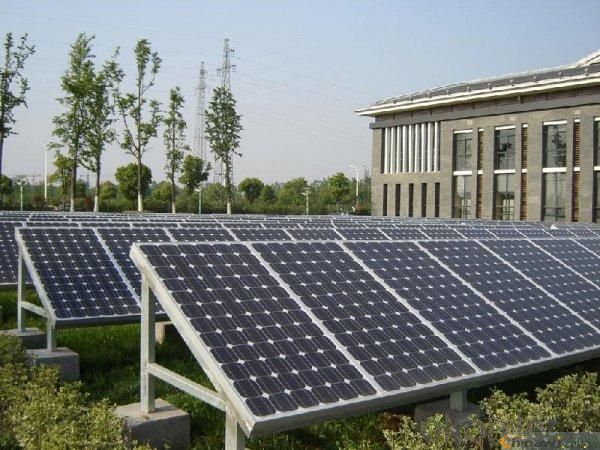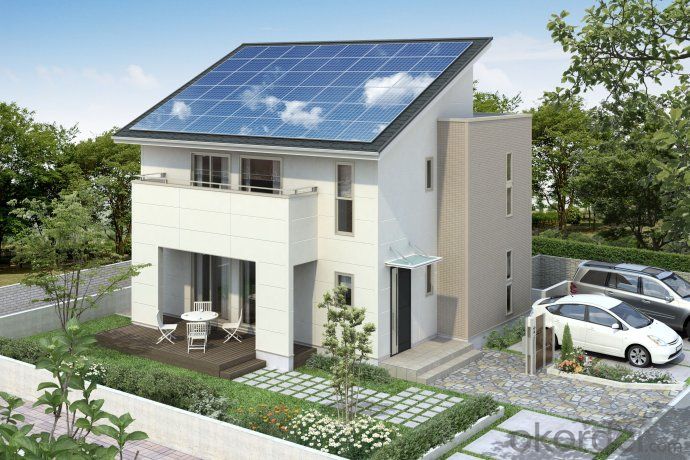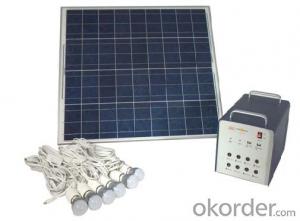Kyrocera Roof and Ground Solar System 2024 New Model
- Loading Port:
- Shanghai
- Payment Terms:
- TT or LC
- Min Order Qty:
- 3000 watt
- Supply Capability:
- 2000000 watt/month
OKorder Service Pledge
OKorder Financial Service
You Might Also Like
Specification
It can load household appliances like TV, Air Conditioner, refrigerator, lighting, washing machine, etc.It can be applied to the villa, household, tourist resorts, prairie areas, remote mountain village, no power supply areas, farms, villages, island, highway and any regions to generate electricity.
Features--- Solar Generator System for Home
1.100% photovoltaic storage system, domestic power supply.
2.New green energy applicable to household appliances, TV and phone charging, etc.
3.Equipped with various safety devices.
Remark: The sunshine rediation will affect the charge time, so we will supply you perfect design according to your local climate.
| Packaging & Delivery | |
| Packaging Detail: | using carton or wooden box as per customer's requirement. |
| Delivery Detail: | within 10~30 days for shipment depending on order quantity |
Excellent battery backup 300W to 10KW off grid solar system with grid power switch
Anern Advantage:
1) Over 10 year experience in clean energy line, business covering solar street light, solar garden light, off grid
solar system and on grid solar power system, etc;
2) Exporting for worldwide, with satisfied clients more than 50 countries;
3) Competitive price, excellent service, integrated certificate system;
Solar system advantages:
1. CE, ROHS approved.
2. High conversion efficiency, high-transmission rate.
3. Energy saving, environmental-friendly.
4. Advanced technology, strict quality control system.
5. Easy installation, safe operation, free maintenance.
6. Low MOQ, fast delivery time, long service life
| Specifications: | ||
| Ref No. | OFF-SGHP-3KW | |
| System Basic Information | Solar Panel Rated Output Power | 3KW |
| Suitable for Max Daily Power Consumption | 10KWH | |
| Rated Output AC Capacity | 3KW | |
| Solar panel | ||
| Type | Crystalline Silicon PV Module, A-class | 12pcs |
| Max Power | 250W | |
| Vmp | 30.5V | |
| Size | 1655*992*45mm | |
| Weight | 22.5kg/pc | |
| 25 years power output guarantee (Note: 2pcs panels connect in series) | ||
| Controller | ||
| Voltage | 48V | 1pc |
| Current | 60A | |
| Warranty | 1 year | |
| PWM high-efficiency charging controller, LED display, intelligent control; Temperature compensation, various protections. | ||
| Circuit Breaker | Used for protection of controller, installed between PV array combiner and controller | 1pc |
| Inverter | ||
| Input Voltage | DC48V | 1set |
| Output Voltage | AC220V/110V 1-phase | |
| Frequency | 50/60Hz | |
| Efficiency | 90% | |
| Note: This inverter provides grid power switch and battery charging functions. | ||
| Battery | ||
| Capacities | 12V/200AH per piece | 8pcs |
| Service life | 5 to 6 years | |
| Warranty | 3 years | |
| Solar panel rack | Flat-roof type mounting rack, steel material, anti-rust treatment | 1 set |
| (Other types of racks can be customized as per client's requirement) | ||
| Cable | 50m | |
| Connectors | 3-terminal connectors, used for panels connection in parallel | 6 set |
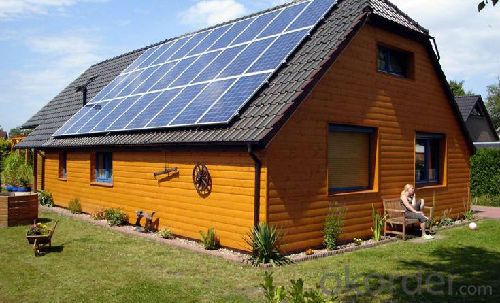
Product features:
1. Off grid solar power system is mainly used for application with relatively-small power consumption, and the areas have no grid network coverage, or grid power is unstable or outage condition.
2. It’s composed of solar panels, hybrid solar inverter, battery bank, solar panel mounting racks, and other accessories required fora complete home solar power system.
3. The battery bank gives a stable power output to the solar inverter which converts DC to AC to power loads, and provides power backup in rainy or cloudy days.
4. The solar panels generate electricity at daytime and charge the battery bank .
5. The off grid home solar power system provides grid power bypass in case of battery power shortage when sunshine is not enough.
6. All the off grid home solar power system configurations are worked out by scientific calculation and design.
FAQ
We have organized several common questions for our clients,may help you sincerely:
①what price for each watt?
it depends on the quantity, delivery date and payment terms,
②what is your size for each module? can you tell me the parameter of your module?
we have different series of panels in different output, both c-si and a-si. please take the specification sheet for your reference.
③Can you provide the peripheral products of the solar panels, such as the battery, controller, and inverter? If so, can you tell me how do they match each other?
Yes, we can, we have two companies for solar region, one is CNBM International, the other is CNBM engineering Co.
We can provide you not only the solar module but also Solar Cells, the off grid solar system, we can also provide you service with on grid plant.
④What is your warranty system?
Our product performance guarantees for 25 years
• 12 years guarantee for workmanship
• Timeliness of delivery
• Quality Products certified (TÜV, UL, CE, ISO)
⑤How do you pack your products?
We have rich experience on how to pack the panels to make sure the safety on shipment when it arrives at the destination.
⑥ Can you do OEM for us?
Yes, we can.
⑦How long can we receive the product after purchase?
In the purchase of product within three working days, We will arrange the factory delivery as soon as possible. The pecific time of receiving is related to the state and position of customers. Commonly 7 to 10 working days can be served.
- Q: Can solar energy systems be used for powering air conditioning in commercial buildings?
- Yes, solar energy systems can be used to power air conditioning in commercial buildings. Solar-powered air conditioning systems, also known as solar cooling systems, use solar energy to generate electricity which is then used to power air conditioning units. These systems can help reduce energy costs and carbon emissions associated with traditional air conditioning systems.
- Q: Can solar energy systems be leased or rented?
- Yes, solar energy systems can be leased or rented. Leasing or renting solar energy systems allows individuals or businesses to enjoy the benefits of solar power without the upfront costs of purchasing and installing the equipment. This option is becoming increasingly popular as it offers a more affordable and flexible way to access clean and renewable energy.
- Q: Can solar energy systems be used for street lighting?
- Street lighting can indeed utilize solar energy systems. The popularity of solar-powered street lights is on the rise due to their ability to provide sustainable and cost-effective outdoor lighting. These systems consist of solar panels that capture sunlight during the day, converting it into electricity which is then stored in batteries. This stored energy is utilized to power the street lights at night. Not only are solar-powered street lights environmentally friendly, but they also eliminate the need for extensive wiring and electricity consumption. They can be easily installed in remote areas without access to grid power, making them a feasible option for street lighting in both urban and rural regions. In addition, solar-powered street lights offer the benefit of being independent from the main power grid, ensuring uninterrupted lighting even during power outages.
- Q: What is solar tracking and how does it improve system efficiency?
- Solar tracking is a mechanism used in solar energy systems to orient solar panels towards the sun, maximizing their exposure to sunlight throughout the day. By continuously adjusting the position of the solar panels, solar tracking ensures that the panels are always perpendicular to the sun's rays, increasing the amount of solar energy captured. This improved alignment significantly enhances system efficiency as it allows for a higher solar energy input, resulting in increased electricity production and overall better performance of the solar energy system.
- Q: Can solar energy systems be used for powering electric vehicle charging pads?
- Certainly, solar energy systems have the capability to power electric vehicle charging pads. Sunlight can be harnessed and transformed into electricity through the installation of solar panels on rooftops or open areas. Consequently, this generated electricity can be utilized to operate the charging pads for electric vehicles. By incorporating solar energy, we not only diminish our reliance on fossil fuels but also mitigate the discharge of greenhouse gases associated with charging electric vehicles using grid electricity. Moreover, solar-powered charging pads can be implemented in remote or off-grid areas where access to the power grid is restricted or nonexistent. This renders solar energy systems an environmentally sustainable and favorable solution for energizing electric vehicle charging pads.
- Q: What is the role of solar energy systems in reducing water usage?
- Solar energy systems play a significant role in reducing water usage by providing a sustainable and renewable source of power that reduces reliance on water-intensive energy sources like fossil fuels and nuclear power. Solar power does not require water for operation, unlike coal or gas-fired power plants that consume large amounts of water for cooling. By promoting the adoption of solar energy systems, we can effectively conserve water resources and contribute to a more sustainable future.
- Q: Can solar energy systems be used in powering swimming pools or spas?
- Yes, solar energy systems can be used to power swimming pools or spas. Solar panels can be installed to capture sunlight and convert it into electricity, which can then be used to run the pool's pump, heater, and other equipment. This helps to reduce energy costs and reliance on traditional power sources.
- Q: Are there any advancements in solar energy system technology?
- Yes, there have been significant advancements in solar energy system technology in recent years. These advancements include improved solar panel efficiency, development of new materials and designs for panels, increased energy storage capacities, and integration of smart grid technologies. Additionally, there have been innovations in solar tracking systems, solar concentrators, and the use of perovskite solar cells, which have the potential to further enhance the efficiency and affordability of solar energy systems.
- Q: Can solar energy systems be used in areas with high levels of air humidity?
- Yes, solar energy systems can be used in areas with high levels of air humidity. While high humidity can affect the efficiency of solar panels to some extent, it does not render them unusable. Solar panels can still generate electricity in such areas, although the output may be slightly lower compared to regions with lower humidity levels. Overall, solar energy systems remain a viable and effective option for power generation in humid environments.
- Q: Are there any tax benefits for installing a solar energy system?
- Installing a solar energy system comes with numerous tax benefits. One significant benefit is the federal investment tax credit (ITC), which permits individuals and businesses to deduct a percentage of their solar energy system's cost from their federal taxes. As of 2021, the ITC offers a 26% tax credit for residential and commercial systems. Moreover, some states provide their own tax incentives for solar energy installations. These incentives may encompass exemptions from property taxes, sales taxes, or state tax credits. The availability and extent of these incentives differ from state to state, necessitating thorough research into the specific incentives offered in your region. Furthermore, the installation of a solar energy system can enhance your property's value. Numerous studies have demonstrated that homes equipped with solar panels yield a higher selling price compared to those without. This boost in property value can yield long-term financial advantages. To fully comprehend and capitalize on all the tax benefits associated with installing a solar energy system, it is advisable to consult a tax professional or a solar energy expert.
Send your message to us
Kyrocera Roof and Ground Solar System 2024 New Model
- Loading Port:
- Shanghai
- Payment Terms:
- TT or LC
- Min Order Qty:
- 3000 watt
- Supply Capability:
- 2000000 watt/month
OKorder Service Pledge
OKorder Financial Service
Similar products
Hot products
Hot Searches
Related keywords

